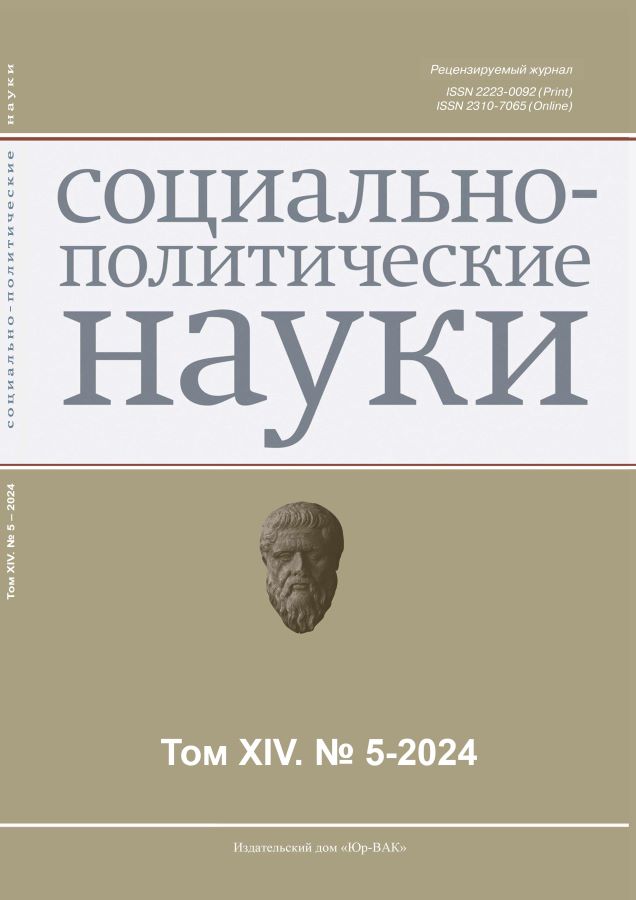Application of a systematic methodology for the study of political processes
- Authors: Likhonosov A.G.1, Vasetsky N.A.1, Pivovarov Y.F.2
-
Affiliations:
- Zhirinovsky University of World Civilizations
- Scientific Research Institute (Military History) of the Military Academy of the General Staff of the Ministry of Defense of the Russian Federation
- Issue: Vol 14, No 5 (2024)
- Pages: 24-30
- Section: History and Theory of Politics
- URL: https://journals.eco-vector.com/2223-0092/article/view/655458
- DOI: https://doi.org/10.33693/2223-0092-2024-14-5-24-30
- EDN: https://elibrary.ru/QWSNHW
- ID: 655458
Cite item
Abstract
The study proposes a methodology for a systematic approach to the study of political processes occurring in political systems. The political system of the state should be based on a scientific and theoretical basis, on the basis of the implementation of normative legal acts, as well as on an ideology that mobilizes the moral forces of the people for the common cause of the country. The stability of political systems is achieved by strengthening the connection or increasing the number of connections between various administrative, economic, regulatory, social, religious, and elements of the political system. The resilience of political systems is stronger if there is a political backlash in the system. The abolition of the institute of “zampolit”, as a kind of backlash in rigid systems, led to an upsurge in crimes related to the abuse of their powers by commanders, especially the tactical level. Subordinates who used to find the truth from the deputy chairman, now go directly to the prosecutor’s office and the courts. Not to mention the role and importance of this institution of power for the personnel filter. The task of formulating a generalizing goal, as an idea for everyone, should be reduced to the task of reducing entropy, where entropy is a measure of chaos and is associated with information, since information leads either to order (elimination of ambiguity, uncertainty, ambiguity) or to disorder (excessive, false information), which is detrimental to the political system.
Full Text
About the authors
Alexander G. Likhonosov
Zhirinovsky University of World Civilizations
Author for correspondence.
Email: lihonosov1968@mail.ru
SPIN-code: 8065-7770
Dr. Sci. (Polit.), Professor, leading researcher
Russian Federation, MoscowNikolay A. Vasetsky
Zhirinovsky University of World Civilizations
Email: socirmsu@gmail.com
SPIN-code: 6441-1800
Dr. Sci. (Hist.), Professor, leading researcher
Russian Federation, MoscowYuri F. Pivovarov
Scientific Research Institute (Military History) of the Military Academy of the General Staff of the Ministry of Defense of the Russian Federation
Email: 9231374445@mail.ru
SPIN-code: 1677-6468
Dr. Sci. (Hist.), Professor, senior researcher
Russian Federation, MoscowReferences
- Bogdanov A.A. Science of public consciousness: A short course of ideological science in questions and answers. 3rd ed. Petrograd; Moscow: Publishing House “The Book”, 1923. 313 p.
- Weber M. The meaning of “freedom from evaluation” in sociological and economic science. In: Weber M. Selected works. Moscow, 1990.
- Dugin A.G. Fundamentals of geopolitics. Fundamentals of geopolitics: Geo-politics the future of Russia. Moscow: Arktogeya, 1997. 599 p.
- Knyazeva E.N., Kudyumov S.P. The foundations of synergetics. Mode with aggravation, self-organization, tempo of the world. St. Petersburg: Aleteya, 2002. 414 p.
- Kryuchkov V.A. On the edge of the abyss. Moscow: Eksmo, 2003. 445 p.
- Novoselsky S.O., Moiseeva O.A., Filippova O.A. Communication policy of executive authorities with the population in social networks. Questions of Political Science. 2023. Vol. 13. No. 3 (91). Pp. 1001–1013. (In Rus.)
- Plato. Collected works. In 4 vols. Vol. 3. Transl. from Ancient Greek. A.F. Losev, V.F. Asmus, A.A. Takho-Godi (gen. eds.). A.F. Losev (author of the introductory arts. and arts. in the note). A.A. Takho-Godi (note). Moscow: Thought, 1994. 654 p.
- Foucault M. To supervise and punish. The birth of the prison. V. Naumov (transl.). Moscow: Ad Marginem Press, cop., 2016. 383 p.
- Fukuyama F. The end of history and the last man. M.B. Levin (transl. from the English). Moscow: ACT: Polygraphizdat, 2010. 588 p.
- Hall A. The experience of methodology for system engineering. Moscow: Soviet Radio, 1975.
- Fromm E. Flight from freedom. In: Fet AI Collection of translations. Philosophical archive, 2016. 232 p.
Supplementary files









